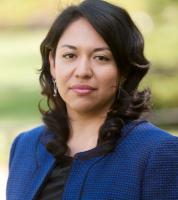Perla M. Guerrero Wins Ford Foundation Postdoctoral Fellowship
April 04, 2014

Assistant Professor in American Studies speaks about her fellowship and research on community, ethnicity and public space.
By Samantha Suplee, ARHU Office of Communications
The 2014 Ford Foundation Postdoctoral Fellowship was awarded to Perla M. Guerrero, assistant professor of American Studies and the first core faculty member in the U.S. Latina/o Studies Program. The fellowship will allow Guerrero to dedicate herself fully to her upcoming book, tentatively titled “Nuevo South: Latinas/os, Asians, and the Remaking of Place.” Over the next academic year, she’ll work with Professor Paul Ortiz at the University of Florida’s Samuel Proctor Oral History Program. The Ford Foundation Fellowship is competitive; in 2013, only 24 postdoctoral scholars were selected for the honor. Guerrero considers her achievement “indicative of the need to understand what’s going on in the South— the legacies of Southern histories. Issues around race are not unique to the South, but the history of the South plays a role in these discourses.”
“Nuevo South” will explore race relations in northwestern Arkansas, a region that has recently undergone major social transformations. Northwestern Arkansas was overwhelmingly white until around 1975, when the United States sent Vietnamese refugees there after the Vietnam War. Subsequent waves of refugees from Cuba in the 1980s and immigrants from Mexico in the 1990s have altered the typical makeup of Arkansan communities. Guerrero’s book will explore how Asian and Latino refugees and immigrants negotiate a sense of belonging in mostly-white places.
“I think Arkansas can be Anytown, USA,” she says. “Diversification of the U.S. is something that’s happening throughout the country. In Arkansas’ racial past, you can see parallels with other places.”
But Arkansas is unique in a couple ways. It is home to the headquarters of Wal-Mart, America’s largest retailer; Tyson Foods, the world’s largest meat producer; and J.B. Hunt, one of America’s largest transportation companies.
“The labor sphere is important because it is the reason people moved to Arkansas, while public space becomes important because it’s where Arkansans see the people that are working in various places,” Guerrero says. “Latinos and Asians are contributing economically, and yet the issues that cause anxieties are when Latinos and Asians are in public space.”
Guerrero believes that her research has a universal quality, and that “Nuevo South” will broaden understanding of communities both in northwestern Arkansas and beyond.
“What I hope my work does is demonstrate that we should be more aware of the way that we react to people when we’re in public, because people are aware of when they are not wanted. We should remember that, and try to learn from history. These experiences, in a lot of ways, are not new.”

